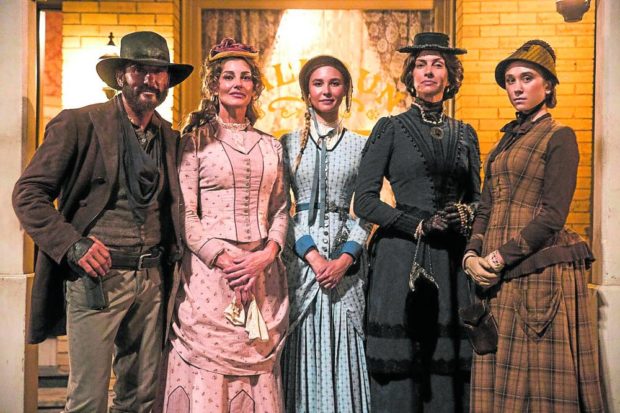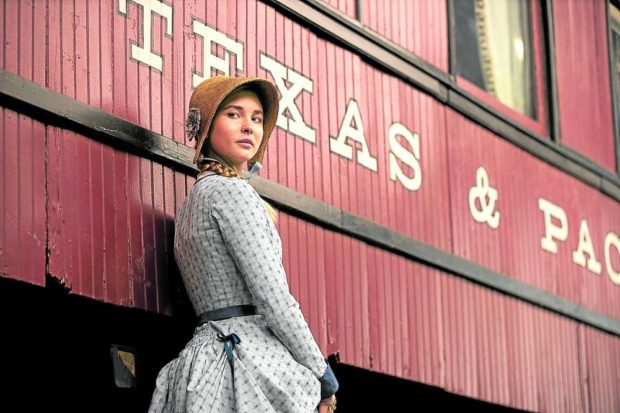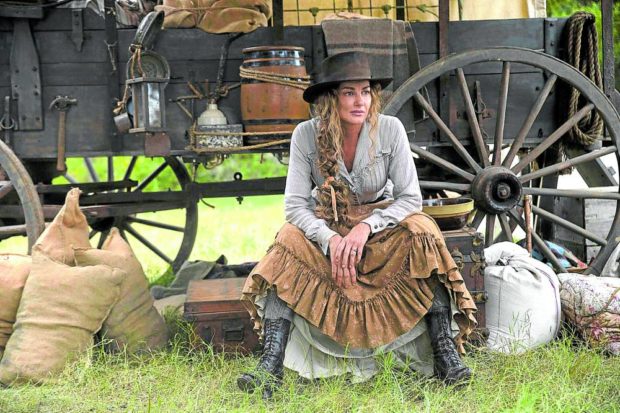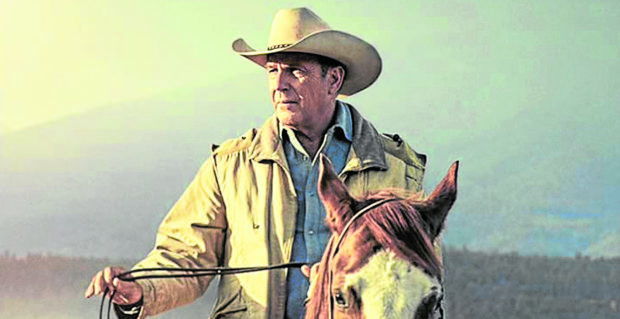Isabel May on what sets ‘king of US primetime’ ‘Yellowstone’ apart from its origin story ‘1883’

From left: Tim McGraw, Hill, May, Dawn Olivieri and Emma Malouff in “1883” —PHOTO BY EMERSON MILLER/PARAMOUNT+
Who would have thought that the biggest entertainment show on US TV this season could be found on cable? In fact, Variety calls the neo-Western drama series “Yellowstone” the “new king of primetime,” especially after the cable series managed to edge out broadcast-network shows as the most-watched series that isn’t football in terms of total viewership and among the prime 18-49 adult demographic.
“Yellowstone” Season 3 made its Southeast Asian premiere last Aug. 1 (with new episodes at 10 p.m. every Monday on the Paramount Network channel) and will end its run on Oct. 3. It chronicles the lives of the Dutton family, led by widowed sixth-generation patriarch John Dutton (Kevin Costner), who controls the largest contiguous cattle ranch in the United States.
In the midst of shifting alliances, unsolved murders, open wounds and the struggle to gain every faction’s respect, the ranch is in constant conflict with those living and operating within its borders: an expanding town, an Indian reservation and America’s first National Park.
Joining Kevin in the show cocreated by Taylor Sheridan and John Linson are Luke Grimes (as Kayce), Kelly Reilly (Beth), Wes Bentley (Jamie), Cole Hauser (Rip), Kelsey Asbille (Monica), Brecken Merrill (Tate) and Will Patton (Garrett Randall), with Jackie Weaver (Caroline), Piper Perabo (Summer) and Kathryn Kelly (Emily) in guest starring roles.
Central figures
Also listed as special guests (in the episode “No Kindness for the Coward”) are real-life power couple and country music luminaries Tim McGraw and Faith Hill, who play James and Margaret Dutton, respectively—John’s great grandparents, who are the central figures in “Yellowstone’s” similarly popular prequel and 10-episode origin story, “1883.”“1883,” set to premiere in Southeast Asia early next year, follows members of the Dutton family, led by James and Margaret, as they embark on a journey west through the Great Plains toward the last bastion of untamed America. Its stellar guests include Tom Hanks and Billy Bob Thornton.
Told from the point of view of James and Margaret’s teenage daughter Elsa (Isabel May), the prequel series, which also features Sam Elliott as a grieving cowboy who lost his wife and daughter to smallpox, is a stark retelling of Western expansion, and an intense study of one family fleeing poverty to seek a better future in America’s promised land: Montana.
To mark the recent Season 3 premiere of “Yellowstone” and the upcoming release of “1883,” we asked the lovely Isabel May via email to discuss her role in the latter and what she thought set the former apart from its deeply evocative prequel.
Our Q&A with Isabel:
In what way are you similar to or different from Elsa or her issues? And why do you think was her point of view best-suited to narrate “1883’s” story, instead of, say, James and Margaret’s?
I felt I could understand Elsa’s inability—and refusal—to be in anyway conventional. She’s far more brave than I am. She represented hope—the one person along the journey who had not succumbed to cynicism and, therefore, was the perfect person to narrate the story.
You really held your own in “1883,” whose story is told from your character’s perspective. Didn’t that put some pressure on you as a storyteller?
The way in which I became involved in the project felt so much like fate, any pressure I probably should have felt never appeared.
“1883” is a prequel, but did you feel you had to watch “Yellowstone” to get emotionally invested in the Duttons’ story? Is there a character in “Yellowstone” that resonated with you the most?
You don’t have to know a single character in “Yellowstone” to watch “1883.” Certain connections are made between the two shows, but they’re very subtle. I love Beth.
Tim McGraw and Faith Hill are country music superstars who make a significant foray into acting in “1883.” How did you build your parent-daughter relationship?
They’re wonderful. Our relationship grew organically and required no effort.
Let me borrow an indelible line from Elsa: To know this story, “you must walk it … bleed into its dirt.” For someone who’s lived this tale, what do you think sets “1883” apart from “Yellowstone” as a TV series?
The tone and style of “1883” are vastly different from those of “Yellowstone.” “1883” is very poetic—it’s almost like watching a novel. INQ


